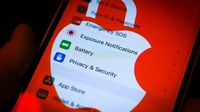Apple has just rolled out a significant update for its users with the release of iOS 18.4.1 on April 16, 2025. This update comes just over two weeks after the launch of iOS 18.4, which introduced new emoji and features. However, iOS 18.4.1 primarily focuses on fixing bugs and enhancing the stability of the operating system.
The release notes from Apple indicate that iOS 18.4.1 addresses two critical security vulnerabilities that could have been exploited in sophisticated attacks. The first vulnerability is linked to Core Audio, which is a fundamental part of the iOS audio processing system. According to Apple, "Processing an audio stream in a maliciously crafted media file may result in code execution." This means that a hacker could potentially execute harmful code on a device by tricking it into processing a malicious audio file.
The second vulnerability pertains to a security feature known as RPAC (Return Pointer Authentication Code). Apple noted that an attacker with arbitrary read and write capabilities could bypass this protection, which is crucial for preventing memory corruption issues. Apple is aware that these vulnerabilities may have been used in targeted attacks against specific individuals, emphasizing the importance of this update for all users.
In addition to the security fixes, iOS 18.4.1 resolves a rare issue that could prevent wireless CarPlay connections in certain vehicles. This has been a common complaint among users, and Apple aims to enhance the overall user experience with this fix.
The updates are not limited to iOS; Apple has also released similar updates for other operating systems, including iPadOS 18.4.1, tvOS 18.4.1, macOS 15.4.1, and visionOS 2.4.1. These updates, which were all released on April 16, are standard for software vendors and focus on bug fixes and performance improvements rather than introducing new features.
To install the latest updates, users can navigate to the Settings app on their devices, select General, and then Software Update. This process ensures that they have the most recent and secure version of the software. Apple also allows users to configure their devices to download updates automatically, which can save time and ensure that devices are always running the latest software.
The build number for iOS 18.4.1 and iPadOS 18.4.1 is 22E252, while macOS 15.4.1 uses 24E263, tvOS 18.4.1 is 22L261, and visionOS 2.4.1 is 22O251. These build numbers indicate the specific versions of the updates released.
Despite the lack of new features in iOS 18.4.1, the importance of these updates cannot be overstated. Users are encouraged to install the updates promptly to protect their devices from potential threats. Apple has made it clear that even if users do not believe they are specific targets of hackers, the nature of these vulnerabilities could affect anyone using the affected devices.
As technology continues to evolve, so too do the methods employed by malicious actors. The sophisticated nature of the attacks that exploit these vulnerabilities highlights the need for users to remain vigilant and proactive about their device security.
Notably, the iOS 18.4.1 update follows the earlier release of iOS 18.4, which brought a host of new features, including updated control center options, enhancements to Apple Photos, and a new recipe feature. For those who may have delayed updating to iOS 18.4 due to concerns about bugs, this latest update offers a chance to enjoy those new features while ensuring that their devices are secure.
With iOS 18.5 and iPadOS 18.5 currently in beta testing and expected to launch in May 2025, users can look forward to more enhancements in the near future. However, the immediate priority should be to install iOS 18.4.1 to benefit from the critical security patches and bug fixes.
In summary, Apple’s release of iOS 18.4.1 is a crucial step in maintaining the security and functionality of its devices. Users are strongly advised to update their devices as soon as possible to safeguard against potential vulnerabilities and to enjoy a smoother, more stable experience with their iPhones and iPads.






